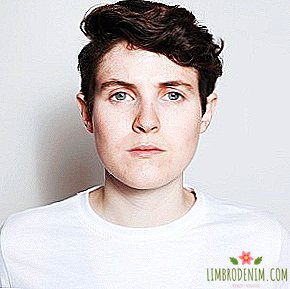The founders of the LGBT festival "Side by Side" about queer cinema
The side-by-side film festival starts on April 23 in Moscow in the framework of which they show a new world cinema on LGBT topics. We talked to the festival’s founders, activist Guley Sultanova and cultural scientist Manny de Guer, and asked them whether it’s difficult to make an LGBT festival in Russia, what queer movies are and how films about gays, lesbians and transgender people make people more open and tolerant .

 You have been making a festival since 2008. Has the situation changed much since then?
You have been making a festival since 2008. Has the situation changed much since then?
Gulya: The situation has changed radically. It cannot be said whether it became better or worse - it became radically different. In 2008, we worked in a completely different social and political situation, with a different attitude towards LGBT people. At that time, the festival was unexpected for the city authorities and society: they knew about lesbians, gays and transgender people, but it was considered indecent to speak out loud about it. The reaction of the press was similar. Gradually, both the city authorities and the media got used to us, and until a certain point we had a good dialogue. After all, the festival is a dialogue with society through cinema, art, discussion, the removal of some kind of complexes and taboos. But since 2011, the policy has changed, Milonov has appeared in St. Petersburg with his own initiatives, then the promotion of homophobia has shifted to the federal level. In 2013, a law was passed to ban so-called propaganda, and the homophobia that was brewing in society was picked up by powerful streams of hatred, which were sanctioned from above. Nazi attacks began, leading state television channels began to indulge in almost fascist remarks. At this time, the festival work is very difficult. The sites where we want to spend it, are afraid of repression.
 The project of Elena Klimova showed that homophobia propaganda really works. How do you find the strength to make an LGBT festival in such an atmosphere of hatred?
The project of Elena Klimova showed that homophobia propaganda really works. How do you find the strength to make an LGBT festival in such an atmosphere of hatred?
Manny: We must not forget that there is another part of society that supports LGBT people, treats us neutrally or has not yet decided on their attitude, and our task is to turn to it. One third of our audience does not belong to LGBT, but we get a lot of positive feedback: thanks to the films and their discussions, people begin to understand what they are talking about, get rid of homophobia, become more tolerant. Yes, the actions of the state complicate our task, but we still see that the situation is changing. The festival gives support to people who identify themselves as LGBT, they become more open, many of our volunteers or visitors to the festival eventually came to come out. Last year, a young girl approached me on the street in St. Petersburg and told me that, thanks to the festival, she decided to open up to her conservative parents, they did not drive her out of the house and go to a dialogue. Such stories confirm that we need to continue what we are doing.

Unfortunately, small groups will always be on the sidelines, at best not be noticed, and at worst - just be hammered

 Is the festival for you more a movie or a policy?
Is the festival for you more a movie or a policy?
Manny: The environment influences this a lot - when we started the festival, we were positive, maybe a little naive ...
Gulya: They thought it was about culture.
Manny: But even in 2008 it was already clear that it was not only about culture, but also about the situation of LGBT people. We organized many heated discussions, invited activists, released the first brochure on how to understand ourselves, accept our homosexuality, admit it.
 While highlighting the LGBT culture in a separate niche, do festivals, unwittingly, contribute to the isolation of the LGBT community, instead of integrating it into society?
While highlighting the LGBT culture in a separate niche, do festivals, unwittingly, contribute to the isolation of the LGBT community, instead of integrating it into society?
RUlya: Ideally, of course, groups should be fully integrated into society, but without losing their identity. These features should not be raised to the absolute, but be preserved as part of the personality. Such film festivals or, for example, LGBT sports federations just support this part of human identity, do not allow it to get lost in society. The important task of such initiatives, as paradoxical as it may sound, is for people to open up in a more open space, where we often do not see any particularities. In particular, we will have a discussion about sexism and homophobia in sports at the festival. Unfortunately, in sports, especially Russian, it is almost impossible to make a coming out. It turns out that being gay, lesbian or transgender, you cannot live this part of your identity as a heterosexual person does. He certainly does not write “I am heterosexual” on the shield, but his whole life implies following certain norms. And LGBT people are limited in expressing their feelings, opinions and basic rights.
Accordingly, initiatives like ours are a force that opposes an attempt at silence or discrimination. Of course, if all these issues are resolved, no LGBT festivals or LGBT sports federations will be needed. But, let's be realistic, it is unlikely to happen. Unfortunately, small groups will always be on the sidelines, at best not be noticed, and at worst - just be hammered. Therefore, we really need various projects that would support them and speak to the majority - you and me, but we remain what we are: Jews, Uzbeks, lesbians or wheelchair users. For example, now in Russia there is no strong movement for the rights of people with disabilities, and because of this we do not see them, although they exist.
 Actually, throughout the 20th century, different groups, uniting in the same way, defended their rights and sought recognition in society, be it women or African Americans.
Actually, throughout the 20th century, different groups, uniting in the same way, defended their rights and sought recognition in society, be it women or African Americans.
Gulya: Because society itself will never be ready. People who are not connected with any problems will not gather and will not say: let us now discuss the rights of persons with disabilities. Their problems for the majority do not exist, they are not thought of.

 Starting from about the 60s, films on homosexual themes appear from time to time, which eventually become cult. However, most of them are part of the mainstream. What then is queer cinema?
Starting from about the 60s, films on homosexual themes appear from time to time, which eventually become cult. However, most of them are part of the mainstream. What then is queer cinema?
Manny: Indeed, over the past 10-20 years, more and more of these films appear and they become commercially successful. But until the 80s such work was not enough. Then independent, low-budget films appeared on LGBT topics, for which the term new queer cinema appeared, introduced by Ruby Rich. These films were first accepted among the LGBT community, and already in the 90s, big producers noticed this movement and realized that they could also make money on this. And then these topics began to penetrate the mainstream. Now, perhaps, a separate wave of queer cinema no longer exists.
 Last year you had more famous directorial names in the program - Xavier Dolan, Keshish, but there are almost no such names in this. What is the reason? They could not get or just removed a little?
Last year you had more famous directorial names in the program - Xavier Dolan, Keshish, but there are almost no such names in this. What is the reason? They could not get or just removed a little?
RUlya: Dolan just made the last film not about LGBT (laugh). It is assumed that (in “Mommy.” - Approx. Ed.) The main character is gay, but this is rather a subtext and not the main theme of the film.
Manny: In 2014, there was the film “Pride”, which took one of the prizes in Cannes, but we did not show it, because it was in wide distribution, people had an opportunity to watch it without us. For the same reason, we did not show at the Almodovar festival.

Even in the US, getting funding for a film in which there are "marginal" scenes is still much harder

 At the same time, Almodovar is a good example of a director with a powerful LGBT identity, which is very popular in Russia. Are you trying to show the unknown more to the viewer? After all, using the mainstream is also a way to show the public that the topic of LGBT people is not in the marginal zone.
At the same time, Almodovar is a good example of a director with a powerful LGBT identity, which is very popular in Russia. Are you trying to show the unknown more to the viewer? After all, using the mainstream is also a way to show the public that the topic of LGBT people is not in the marginal zone.
Manny: Show cool, famous movie - this is a very useful way. The same Dolan is already mainstream, and when we showed it two years ago, a new audience came to us, many young people ...
RUlya: Hipster. But we Dolan showed back in 2010, "I killed my mother" was our opening film. Every year we have the opportunity to show 30-40 films shot by different directors from different countries. But it must be understood that even in the United States or other advanced Western democracies, getting funding for a very good film, in which there are "marginal" scenes, is still much harder. If this is not Francois Ozon, not Almodovar or Gus Van Sainte. And that, even they have difficulties. LGBT cinema has now become much more, but it still hardly makes its way.
 In Russia, apparently, with lgbt-movie everything is really bad?
In Russia, apparently, with lgbt-movie everything is really bad?
ghoul: There is an example of art-house "Cinema without Borders", which always took lesbian, gay films, movies on transgender themes. Now they are practically not allowed to live, even with Adel’s Life there were difficulties, despite the film’s fame. The presence of awards does not help here. There is a wonderful Russian film "Winter Way", which received a bunch of prizes, but it was practically not allowed to roll around the country. It was after this film became widely known that they began to accuse him of propaganda that in different cities there were assaults on cinemas that took him. Russia is an extreme case, but all over the world, if you want to get money for a regular movie or for a movie with LGBT themes, you will feel the difference.

 In your program, for my taste, there was a frontal Polish film “In the name of” Malgorzata Shumowska about homosexual passion in a religious environment. He took the LGBT award "Teddy" at the Berlinale, although there in the same year in the program "Panorama" showed the beautiful "It's All So Quiet" Nanuk Leopold, in which the LGBT theme was introduced much more subtly. but it went completely under the Teddy radars. You do not have the feeling that LGBT prizes give more for a loud statement than for the merits of the film itself?
In your program, for my taste, there was a frontal Polish film “In the name of” Malgorzata Shumowska about homosexual passion in a religious environment. He took the LGBT award "Teddy" at the Berlinale, although there in the same year in the program "Panorama" showed the beautiful "It's All So Quiet" Nanuk Leopold, in which the LGBT theme was introduced much more subtly. but it went completely under the Teddy radars. You do not have the feeling that LGBT prizes give more for a loud statement than for the merits of the film itself?
Manny: Not necessary. We showed in the program "Matterhorn", where there is an element of LGBT-related subjects, but this is an excellent film in the universal context. Only in its finale it becomes clear what the internal conflict of the hero is. As for the Teddy Award, this is a very political prize, and I and Gul were there on the jury. Award creator Wieland Speck always makes a speech about why it is important to give a prize to this particular film. The jury can choose anything, but the purpose of this prize is publicity for such films and the topics raised in them. Therefore, it is likely that the jury sometimes chooses films where the topic is more accessible and vivid.
 The program "side by side" a lot of films about youth. Is this a reflection on the important stage in the formation of sexuality or is it a consequence of the cult of youth that is in gay culture?
The program "side by side" a lot of films about youth. Is this a reflection on the important stage in the formation of sexuality or is it a consequence of the cult of youth that is in gay culture?
Manny: Indeed, there is a certain image that gay culture is always young. But now there is a tendency in LGBT cinema to make a movie about elderly people - for example, a month ago we showed a film by Ira Saks in Moscow “Love is a strange thing” about a couple of elderly gays. Yes, with the opening film, we will have a Brazilian film about a teenager who gives a very positive example of a coming out - this is the story of a boy who is not particularly worried about the fact that he is gay. At the same time, we show “Violetta” about the writer who fell in love with Simone de Beauvoir, this is the story of a 40-year-old woman. "Tuesday 52" - at the same time about a 16-year-old girl and her mother, who in adulthood decided to have an operation to correct the sex.

There is an opinion that gay culture is always young. But now there is a tendency in LGBT cinema to make a movie about elderly people.

 In pop culture and glossy now also lifted a taboo on age. probably gay cinema also responds to time requests?
In pop culture and glossy now also lifted a taboo on age. probably gay cinema also responds to time requests?
Manny: Yes, now there are complaints in the mainstream that there are no good roles for mature actresses. On the Oscars, Patricia Arquette spoke about unequal pay, Meryl Streep raises the question that there are no strong roles for older women.
RUlya: I think this is very cool. Because people are much more diverse than the way the total mainstream represents them: only young, beautiful, heterosexual, white, wealthy. All who fall out of this series, remain on the sidelines. And these people are beginning to demand that they, too, be represented in pop culture. And the fact that in LGBT cinema began to make more films about aging, also suggests that the LGBT community itself is getting older. The rights movement began thirty years ago, and those who started it were 20-30 years old, and now 60, and they are just as ready to talk about themselves at this age without shame. That they also have problems, not only 15-year-olds, who are only aware of themselves. We are getting older and we know what interesting plots there are, that those who are over 50 and 60 also have life. And it is very good that these changes in public consciousness are immediately reflected in art and as a result of its audience. The same Ira Saks, who shot films about 30-35-year-old gays before, made the last film about a 60-year-old couple who have been together for 39 years. And even he was worried about how his film would be perceived in New York, a city that is considered the most progressive in terms of rights and freedom for LGBT people - if there would be a failure, including at the box office. But this did not happen.
 We can also recall the wonderful series "Transparent", where the divorced father of the family at the age of 75 makes a coming-out. Is this somehow reflected in the audience of your festival?
We can also recall the wonderful series "Transparent", where the divorced father of the family at the age of 75 makes a coming-out. Is this somehow reflected in the audience of your festival?
Manny: Most of the public here is 24-35 years old. The older generation is afraid to even go to the festival. The younger generation also has this fear, but the older one has much more.
RUlya: But we are trying to attract older audiences, including showing films about older people. We showed Ira Saks's “Love is a strange thing” about an elderly couple, and we had a discussion about older LGBT people. We wanted to call on her homosexual people of the older generation, and it turned out that they are very difficult to find. In all of Moscow, we found three people older than 60. But it's great that three, I think, in St. Petersburg, we would find two. And in other cities no one would agree. They came and told how in the Soviet Union they socialized, tried to fight for themselves, not even in terms of politics, but simply at the level of everyday things, at work. They conquered a piece of their personality. Probably 5-6 people of the same age came with them, and all the rest were young and middle.





 You bring documentary to Moscow "Battle of the sexes" about the match between tennis players Billie Jean King and Bobby Riggs, and you will have a panel on feminism and LGBT. can you explain what is the connection between them?
You bring documentary to Moscow "Battle of the sexes" about the match between tennis players Billie Jean King and Bobby Riggs, and you will have a panel on feminism and LGBT. can you explain what is the connection between them?
RUlya: Now in Russia, it seems, has matured the moment when feminism will, finally, come out. Before that, it existed in the forms of gender studies and was located in a more academic space. And now in Russia there are real activist groups of women who identify themselves as feminists. These women are ready to do art projects, go to demonstrations, write to the media, which now almost equates to a demonstration, knowing what a flurry of rejection it causes. It reminds me of what happened with the LGBT movement 5-6 years ago, and we support this wave in Russia. On the other hand, of course, the struggle for LGBT rights is closely linked to the struggle for women's rights. Because the discriminating element here is one - this is the floor. In the case of LGBT, it can be gender, gender, sexual orientation, but this is the general construct that makes a person discriminated against. We understand how this happens on the example of women: here you have such and such signs, it means that you are to the right, and to you to the left, you can do it, but this is impossible for you.
In general, sexism and discriminatory attitudes toward women are even stronger than homophobia or transphobia. Because, after all, LGBT is a small minority, we are at most 10% of the entire population of the planet, and the majority of women. At the same time sexism is absorbed with mother's milk, it is spread in society, we live in this culture. Not yet aware of ourselves or our sexual orientation, we are already included in the gender scheme, when the boy is told from childhood “don't be a woman”. It is much less likely that the boy will be gay than if he manifests some kind of "female" line.
As for the film “Battle of the Sexes”, firstly, it is very well done: at the same time serious, but at the same time entertaining, lively, dynamic. Billie Jean King herself was first a feminist and then later came out as a lesbian. In the 80s she became an open lesbian and advocated for LGBT rights. At the end of the film, Obama gives her a prize for her contribution to the development of LGBT rights. By the way, tennis is now the only sport in which pay for women is equal to pay for men. And it is also very powerful sobering.
 in Russia about LGBT and feminism are almost identical prejudices. Moreover, in a phallocentric society, there is a cliché "if you are a feminist, it means you are a lesbian": most likely, you became a terrible lesbian and feminist because men did not pay attention to you.
in Russia about LGBT and feminism are almost identical prejudices. Moreover, in a phallocentric society, there is a cliché "if you are a feminist, it means you are a lesbian": most likely, you became a terrible lesbian and feminist because men did not pay attention to you.
Manny: In fact, many feminists were against lesbians, they sought to distance themselves from them and did not want to associate with each other.
RUlya: We must not forget that there were many currents of feminism. Some believed that lesbians discredit feminism precisely because such a stereotype works. “If you are for feminism, then you are against men,” and if you are against men, then you are lesbians. Although, of course, lesbians are not against men, as, in fact, feminists. Конечно, существуют лесбийский сепаратизм и радикальный феминизм, а также, вероятно, есть мужчины, которые считают, что им комфортнее жить друг с другом вдали от женского общества. Ну и пожалуйста. Каждый человек решает за себя и для себя, главное, чтобы он не ущемлял в правах другого человека.
Photo: Люба Козорезова




